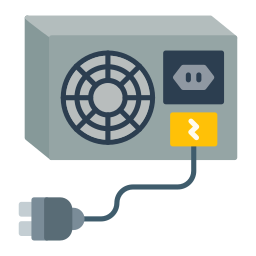
PSU (Power Supply Unit): Computer Hardware Components
The Power Supply Unit (PSU) is a critical hardware component within a computer system responsible for supplying electrical power to all other internal parts. It acts as the intermediary that converts electrical energy from an external source, usually alternating current (AC) from a wall outlet, into usable direct current (DC) voltages required by the computer’s components. The PSU ensures the stability, efficiency, and safety of power delivery, making it indispensable in any desktop or server setup.
Functions and Applications of the PSU
Converts electrical power: The PSU changes the AC power from the mains into various DC voltages that computer components require, such as 12V, 5V, and 3.3V. This conversion is vital because electronic components operate on DC power.
Supplies consistent and stable voltage: A high-quality PSU provides steady and reliable voltage output, preventing sudden power fluctuations that could damage sensitive hardware components like the CPU, motherboard, memory, and storage devices.
Protects against electrical faults: PSUs include built-in protection features such as over-voltage protection, under-voltage protection, short circuit protection, and overcurrent protection. These safeguard the computer from damage caused by electrical irregularities.
Powers all internal components: The PSU supplies energy to the motherboard, graphics cards, hard drives, solid-state drives, cooling fans, and peripheral devices, enabling the entire system to function.
Facilitates power management: Many modern PSUs support power efficiency standards and technologies that reduce energy consumption during low load conditions and contribute to quieter operation through temperature-controlled fan speeds.
Supports upgrades and expansions: A PSU with adequate wattage capacity allows users to install additional components such as high-performance graphics cards, multiple storage drives, and other peripherals without risking power shortages.
Types of Power Supply Units
Standard ATX PSU: The most common form factor used in desktop computers, designed to fit standard ATX cases.
Modular PSU: A variation of the standard PSU where power cables can be detached individually, improving cable management and airflow inside the case.
SFX PSU: A smaller form factor power supply designed for compact cases where space is limited.
High-wattage PSUs: These units provide higher power output for gaming rigs, workstations, or servers that require more electrical power.
Efficiency Ratings
Power supplies are rated based on their efficiency, which refers to how much input power is converted into usable output power. Common certifications include 80 Plus Bronze, Silver, Gold, Platinum, and Titanium, with Titanium being the most efficient.
Higher efficiency PSUs generate less heat, consume less electricity, and tend to be more reliable.
Cost and Availability
PSUs are typically sold separately when building custom computers but are included with prebuilt systems.
The price varies depending on wattage, efficiency rating, modularity, and brand.
Basic power supplies with lower wattage and efficiency ratings are more affordable but may offer less stability and shorter lifespans.
High-end PSUs with modular cables, high efficiency, and robust protections command higher prices but provide better performance and durability.
Comparison of PSU Features
Non-modular PSUs come with fixed cables, which may create clutter inside the case and restrict airflow.
Semi-modular PSUs have some detachable cables, balancing cost and convenience.
Fully modular PSUs allow all cables to be disconnected, enabling the cleanest build and best airflow management.
Efficiency certifications help users choose PSUs that save energy and reduce heat output.
Maintenance and Lifespan
PSUs generally require minimal maintenance but should be kept free from dust and debris to avoid overheating.
The fan inside the PSU may wear out over time, potentially necessitating replacement.
A high-quality PSU can last many years, whereas cheaper models might fail sooner, risking damage to other components.
Conclusion
The Power Supply Unit is an essential hardware component that powers and protects the entire computer system. Its ability to convert and regulate electrical power ensures that sensitive internal components receive stable and reliable energy. While PSUs come in various types, efficiencies, and price ranges, investing in a quality power supply is crucial for system stability, energy efficiency, and hardware longevity. The choice between modular and non-modular, efficiency ratings, and wattage capacity depends on the user’s needs, system requirements, and budget. Overall, the PSU serves as the backbone of a computer’s power management, playing a vital role in its performance and durability.












